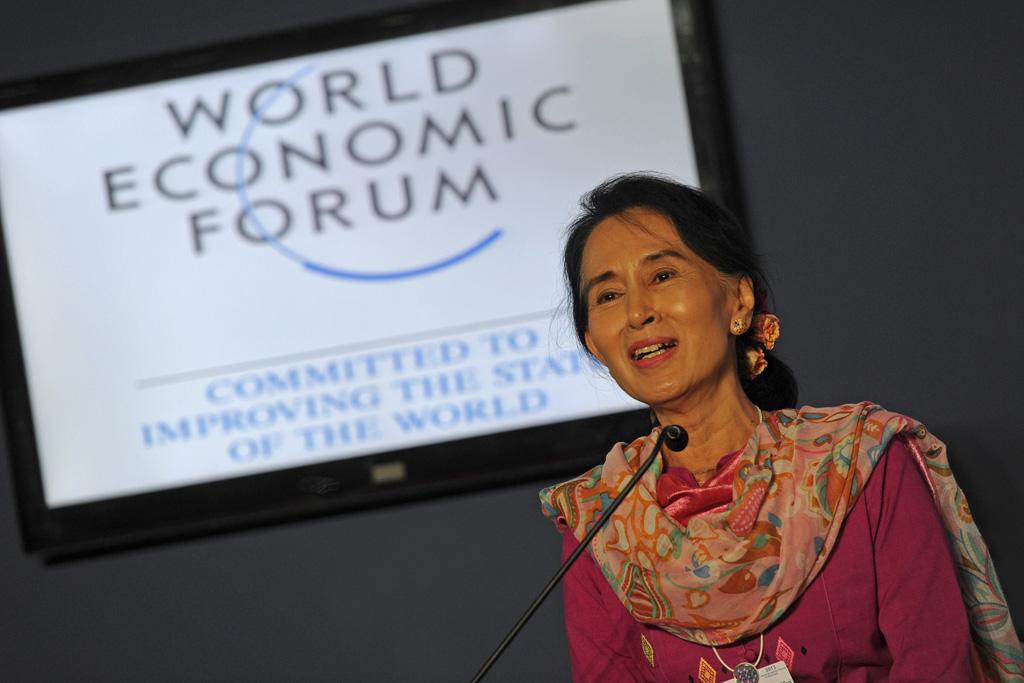Aung San Suu Kyi talks presidency, poverty and rule of law at World Economic Forum
Myanmar democracy leader Aung San Suu Kyi speaks at a press conference during the World Economic Forum on East Asia at the Myanmar International Convention Center in Naypyidaw on June 6, 2013. Aung San Suu Kyi on June 6 declared her intention to run for president, calling for all of the country’s people to share the fruits of its dramatic reforms. AFP PHOTO / Soe Than WIN (Photo credit should read Soe Than WIN/AFP/Getty Images)
Aung San Suu Kyi, chairman of Myanmar’s National League for Democracy (NLD), candidly reiterated her desire to hold presidential office earlier today, on the first day of the World Economic Forum, taking place in Myanmar’s capital city of Naypyidaw.
Released from house arrest in 2010 after serving 15 years for dissenting against the ruling military, she presently serves as a member of parliament from the Kawhmu constituency, and said the country’s constitution must be amended in order to create the possibility for a Suu Kyi presidency.
A clause in the current constitution bans anyone with a foreign spouse or child from running for office. Michael Aris, Suu Kyi’s late husband, was English and their two sons hold British passports. When asked about the likelihood of changes being made, she said she does not believe in indulging optimism, but rather will “work for the constitution to be amended.”
“We do the impossible each day,” she went on to say. “Miracles take a little longer.”
While the frank declaration that she is seeking office seems to have been the big event of the conference, Suu Kyi and reporters continually returned to youth unemployment, poverty and rule of law. Two years into Thein Sein’s presidency, she said the reform is lacking structure, and the people are not seeing results.
“If you talk to the man on the street, if you talk to people in villages, the great majority of them would say their lives have not changed since 2010,” she said. “I always ask what they need most, and always the answer is jobs. They want work, they don’t want handouts. They want the dignity of being able to work for their own living, to earn their own living.”
Listing the needs of the people in order of severity, Suu Kyi said there are six elements: jobs, water, roads, electricity, education and health. Emphasizing the need for jobs, she pointed out that about 75 percent of the country’s youth are unemployed. The transforming government and her party are pushing for laws on minimum wage, and legislation on Foreign Direct Investment to create work opportunities. She assured listeners that it is not the joblessness she finds so worrying, but the hopelessness.
“They will become a social issue when they lose hope in the future,” Suu Kyi said.
What is the way to replenish hope? The answer to that question, according to the NLD leader, is twofold. First, Myanmar must reduce poverty.
“Reducing poverty in Myanmar means reducing poverty in our rural areas,” she asserted.
Nearly 70 percent of the country’s population lives in rural areas, making Myanmar an agricultural country. So, she said, the way to reducing rural poverty is to push for agricultural policy that starts with land — landlessness, and correcting the illegal transfer of land, which she admits is a complicated issue.
The second answer, she said, pertains to rule of law. Across the board — regarding poverty, education, or violence — it is not enough to simply write and approve legislation.
“Rule of law means not just creating laws, but we also have to make sure that these laws are being observed and implemented,” Suu Kyi said.
Three years into reform, Suu Kyi said the government needs structure: to look at the needs of the people, see what needs to be done and then figure out how to go about it:
“What I would like to ask the world to do is help us to find the solutions to our own problems, in our own way — always upholding the international standards for human rights.”
Every day, reporters and producers at The World are hard at work bringing you human-centered news from across the globe. But we can’t do it without you. We need your support to ensure we can continue this work for another year.
Make a gift today, and you’ll help us unlock a matching gift of $67,000!
